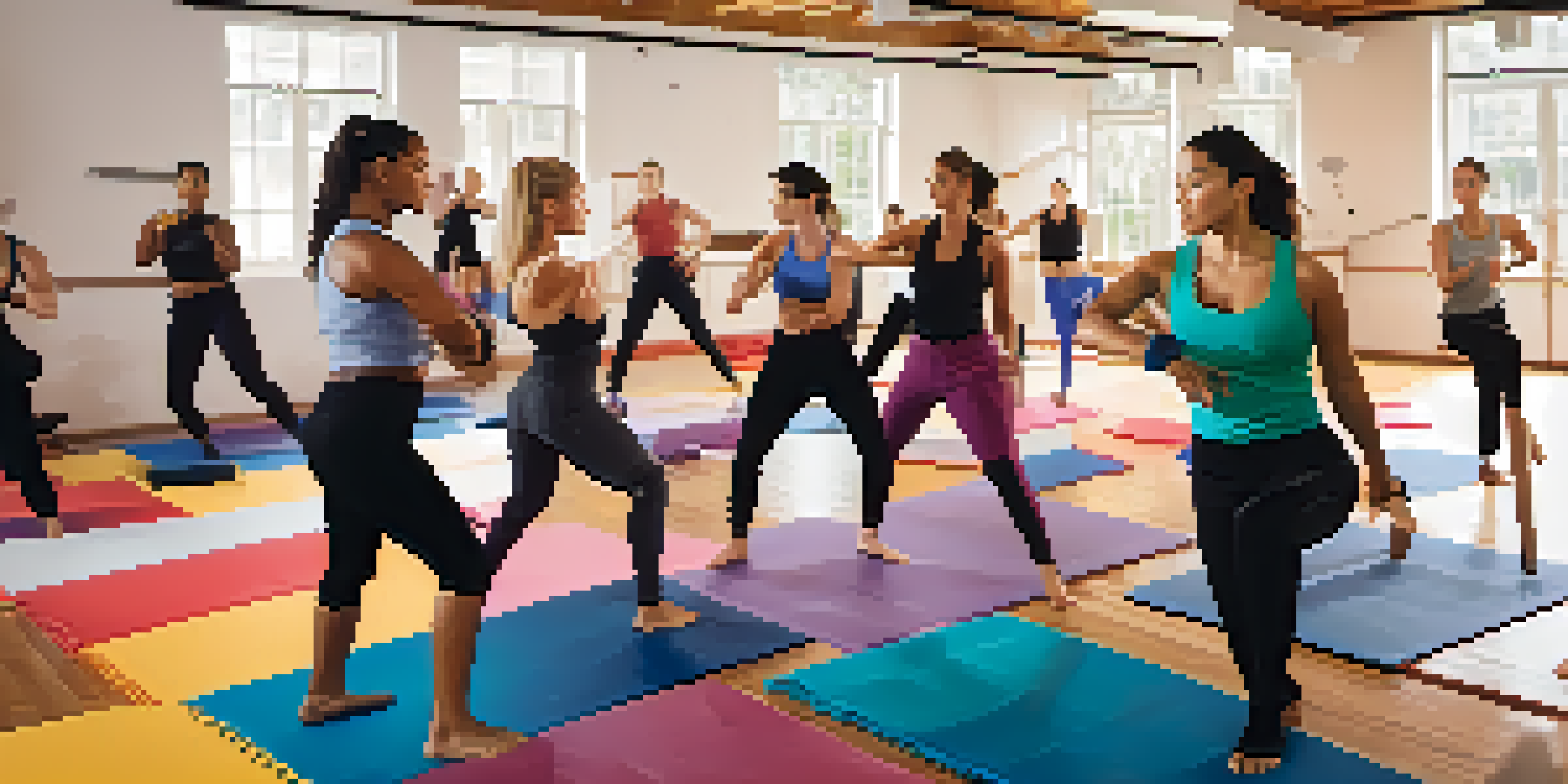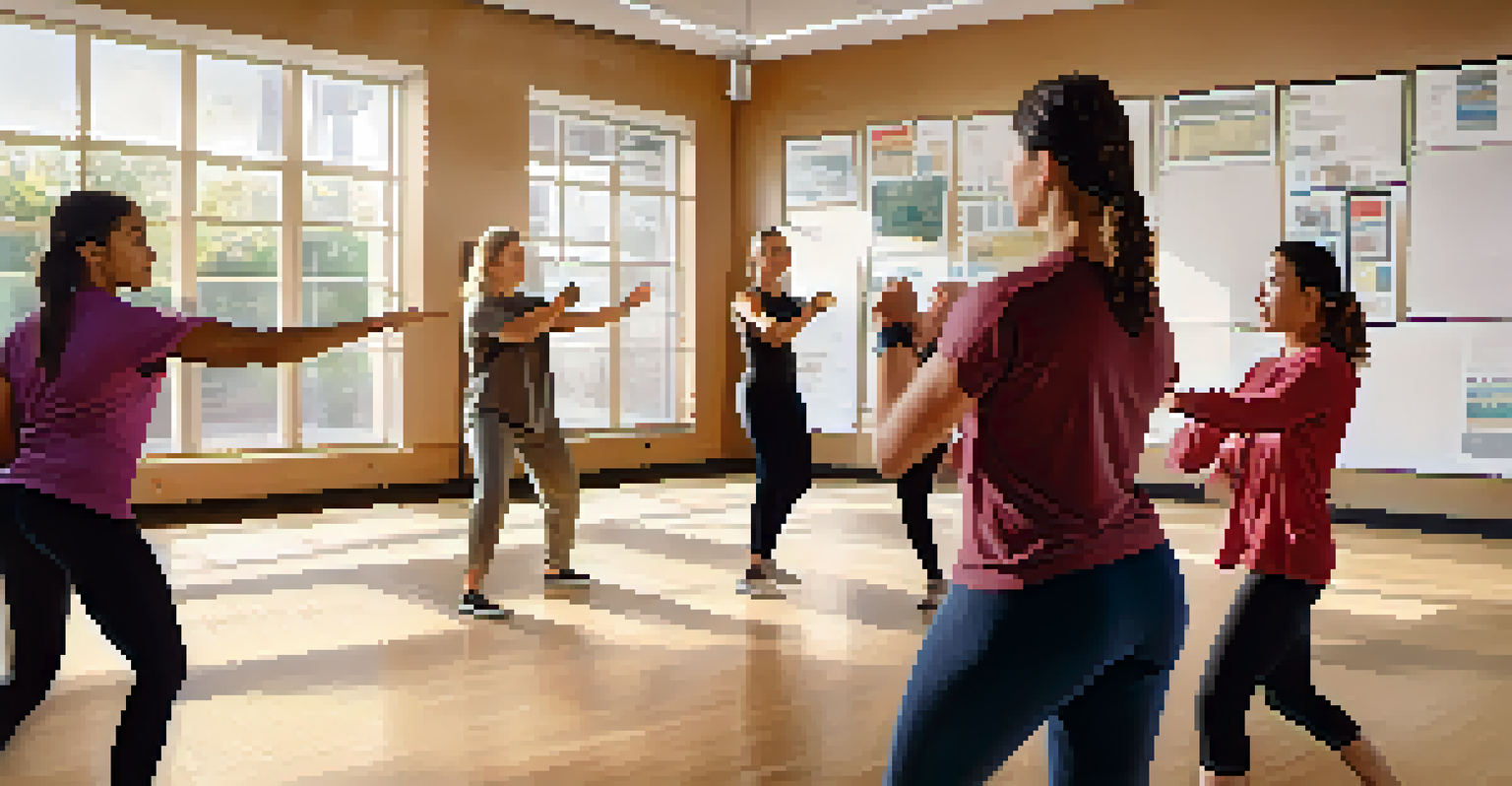Self-Defense Classes: Finding the Right Fit for Women

Understanding the Importance of Self-Defense for Women
Self-defense is not just about physical strength; it's about empowerment. For women, learning self-defense can build confidence, enhance awareness, and provide practical skills to handle potentially dangerous situations. It’s essential to approach self-defense training as a means to reclaim personal safety and autonomy in a world where threats can be unpredictable.
Self-defense is not just a skill; it's a mindset that empowers you to take control of your safety.
Many women find that self-defense classes not only teach them how to protect themselves but also foster a sense of community among participants. This supportive environment can lead to lasting friendships and shared experiences, making the learning process enjoyable and less intimidating. Additionally, these classes often emphasize mental preparedness, helping women to think clearly in stressful situations.
Ultimately, understanding the importance of self-defense is the first step toward finding the right class. It sets the foundation for the skills, techniques, and mindset that will empower women to respond effectively to threats, no matter their size or background.
Types of Self-Defense Classes Available
When searching for self-defense classes, you'll encounter various styles, each with unique techniques and philosophies. Common options include Krav Maga, Brazilian Jiu-Jitsu, and traditional martial arts like Karate and Taekwondo. Each discipline offers different approaches to self-defense, so it's essential to explore what resonates most with you.

For example, Krav Maga focuses on real-world scenarios and practical techniques that are easy to learn. On the other hand, Brazilian Jiu-Jitsu emphasizes grappling and ground defense, making it effective for smaller individuals against larger opponents. Understanding these distinctions will help you align your learning with your personal preferences and goals.
Self-Defense Empowers Women
Learning self-defense builds confidence, enhances awareness, and equips women with practical skills to handle dangerous situations.
Additionally, consider the class format—some may offer group sessions, while others provide one-on-one training. Each format has its benefits, from building camaraderie in group classes to receiving personalized attention in private lessons. Knowing what type of environment you thrive in will guide your choice.
Identifying Your Goals for Self-Defense Training
Before enrolling in a self-defense class, it's crucial to define your personal goals. Are you looking to gain confidence, learn specific techniques, or improve your overall fitness? Understanding your objectives will help you choose a class that aligns with your aspirations and keeps you motivated throughout the training process.
The best defense is a good awareness of your surroundings and the confidence to act when necessary.
For instance, if your primary goal is to boost confidence, look for classes that emphasize situational awareness and assertiveness training. Alternatively, if you're interested in physical fitness, consider classes that combine self-defense techniques with cardio workouts. Establishing clear goals will ensure that your training experience is both fulfilling and effective.
Remember, self-defense training is a personal journey, and your goals may evolve over time. Being open to adapting your objectives as you progress will lead to a more enriching experience and develop skills that serve you well in various aspects of life.
Considering Instructor Qualifications and Experience
The quality of instruction can make or break your self-defense experience, so it’s essential to research the qualifications and experience of potential instructors. Look for instructors who have a background in self-defense, martial arts, or law enforcement, as they bring valuable insights and real-world experience to their teaching. Their expertise will enhance your learning and provide you with effective techniques.
Additionally, consider the instructor's teaching style. Do they create a positive, encouraging atmosphere? Are they patient and approachable? Finding an instructor who resonates with you can significantly enhance your motivation and enjoyment during classes. After all, self-defense training should be a safe and empowering experience.
Choose the Right Class for You
Different self-defense styles and class formats cater to various goals, so it's essential to find one that aligns with your personal preferences and objectives.
Don't hesitate to ask for references or read reviews from other students. Their testimonials can provide insight into the instructor’s effectiveness and the overall class environment. A well-qualified instructor is crucial for ensuring that you learn the necessary skills and feel comfortable in your training.
Evaluating Class Structure and Curriculum
When choosing a self-defense class, the structure and curriculum can greatly influence your training experience. Look for classes that balance technique practice, situational drills, and physical conditioning. A well-rounded curriculum ensures that you not only learn effective techniques but also develop the stamina and reflexes needed to apply them in real-life scenarios.
Some classes may include discussions on personal safety, conflict avoidance, and de-escalation techniques, which are just as critical as physical skills. Understanding how to avoid confrontations altogether can empower you to navigate situations safely. Make sure the curriculum covers a comprehensive approach to self-defense.
Also, consider the frequency and duration of classes. Consistency is key to mastering self-defense skills, so find a schedule that fits your lifestyle. Whether it’s weekly classes or intensive workshops, ensuring that you can commit will lead to better retention of skills and increased confidence over time.
Finding Classes in Your Local Area
Once you've identified your goals and preferred style, the next step is finding self-defense classes in your area. Start by searching online for local studios, community centers, or gyms offering self-defense training. Many places provide introductory classes, allowing you to try out different options before committing long-term.
Word of mouth can also be a valuable resource. Ask friends, family, or colleagues if they have recommendations for reputable classes. Personal experiences can help you find a welcoming environment that meets your needs and aligns with your goals.
Instructor Quality Matters
The effectiveness of self-defense training heavily relies on the instructor's qualifications and teaching style, making it crucial to choose someone who resonates with you.
Additionally, don't hesitate to visit potential locations to observe classes in action. This firsthand experience can give you a sense of the class dynamics, instructor engagement, and overall atmosphere. Seeing a class before diving in can make all the difference in finding the right fit.
Budgeting for Self-Defense Classes
As with any educational pursuit, budgeting for self-defense classes is an important consideration. Prices can vary widely based on the instructor's experience, class location, and curriculum offerings. Determine what you’re willing to invest in your training, keeping in mind that quality instruction often comes at a higher price.
In addition to class fees, consider other costs such as uniforms, gear, or travel expenses. Some studios may require you to purchase specific equipment, while others may provide it. Understanding the total cost upfront can help you avoid surprises and ensure you can commit to your training.

Lastly, look out for promotions or package deals that some studios may offer. Many places provide discounts for signing up for multiple classes or bringing a friend along. Taking advantage of these opportunities can make self-defense training more accessible and enjoyable.